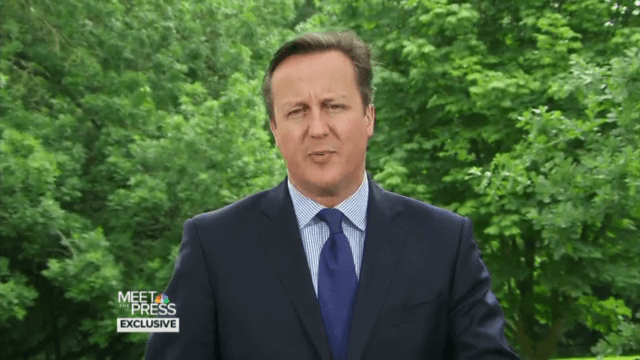Britain’s Labour Party activists couldn’t reconcile their hero Tony Blair being such good mates with then President George W Bush. One was a post-modern progressive. The other was a hillbilly conservative Republican. What was going on?
A similar cognitive dissonance exists within British conservative circles today. Though far more controllable, right-wing Tories – the few that there are left – cannot stand to see their new-found mate David Cameron cosying up to the socialist-by-any-other-name Barack Obama.
So this morning’s appearance of NBC’s Meet the Press would have been tough to swallow, especially with Mr Cameron waving a piece of paper around, declaring “peace in our time” over the recent Iran deal.
“All to the credit of the U.S. administration… to Barack Obama,” Mr Cameron said today, despite one of the more crucial parts of the deal being a big fat boot into the long-grass; Iran’s inching closer to a nuclear bomb won’t be halted for more than 15 years. A lifetime in politics, but a blink of an eye in the course of human history. As the eponymous Great Uncle Napoleon — a fierce Anglosceptic Persian from Iraj Pezeshkzad’s 1973 novel — used to say, “To the grave it’s ah… ah…ah…ah…” indicating his proximity to demise.
“Why now, why not a year from now?” asked NBC’s Chuck Todd. Well because the Iranians may have developed a nuclear bomb in that time frame, replied Mr Cameron. Either dropping a bombshell of his own, that the international community knew of Iran’s increasing ambitions in this area, or revealing what I believe to be the truth: because he and his mate Obama are in power now, and perhaps a Republican president next year, or even Hillary Clinton for that matter, may not be such a pushover on the issue.
The international community had to act now because they have a wimp in the White House.
But if we accept Mr Cameron’s claims at face value – that Iran could have a bomb within a year – isn’t that an admission by him that the sanctions on the country up until now simply weren’t tough enough? Or that Western intelligence isn’t good enough? Don’t sell me your new idea by telling me your last one was a dud.
The truth of the matter is what Mr Blair did to British politics, more so than any of his predecessors, some of whom can be accused of similar things, was to create a politics of legacy and a cult of personality.
His rushes into Bosnia, Iraq, and Mr Cameron’s own rush into Libya are evidence enough of this, whichever side of the argument you came down on about the wars. It’s harder for people like me in fact, who offer their backing to international interventions, to admit this. But intellectual honesty is what should set apart critics from politicians. For me, it’s not about whether or not we killed Saddam Hussein, but what our strategy was afterwards. Apparently we had none, or from what I’m told, backed away from the idea of installing a Western governor of the country and recouping the monetary cost of the war from a deal with the Iraqi people.
Which is why it concerns me even more that the war on “ISIL”, as Mr Cameron insists on calling them, is about to be stepped up from a British perspective.
The Prime Minister wants British forces engaged in Syria now too, not just Iraq, and made it clear this morning that he intends to attempt to carry parliament with him, despite their rejection of his plans just two years ago.
It’s little wonder he praises the European Union so much on Meet the Press: he’s employing the same tactics they did when Ireland voted no to the Euro. “We don’t like that referendum result. Let’s have another one”.
Some may suggest the situation has changed enough, both in the British Parliament and in Syria, to merit reconsideration. But his own backbenchers have better read the situation, with the chairman of Britain’s defence select committee saying this weekend: “I think how I vote [on whether the UK should join US-led air strikes over Syria] will depend on whether the prime minister, instead of making this up on the hoof as has been the case I’m afraid up till now, presents parliament with an integrated strategy, approved jointly by the heads of the armed forces, as something that could produce a decisive result.”
Yes, a strategy, rather than an attempt to look tough and committing our servicemen and women to a war in your own honour. That’d be great, Mr Cameron.
But if his fag-packet solutions for tackling extremism in the UK are any guide, I sincerely doubt he has worked out the 50+ year plan needed to combat radical Islam.
His proposals, to chuck money at the situation, and arbitrarily define political extremism, sound awfully Blairite to me. By which I mean that previous British governments have in fact inadvertently been funding extremists and extremist groups – moderates by day, nutters by night – in their attempts to spend money and to “be seen” to be addressing the problem.
Cameron naively mirrors Blair’s cynicism in so many other ways that I simply can’t see how we trust this man with the security of our country anymore.
He’s gloating about believing the Iranians, the world’s largest state sponsor of terrorism, and he’s giving speeches almost every month about the extremist threat in Britain. And yet, what changes? Where’s the grand strategy? Where’s the realisation that it’s the government’s own cowardice, multiculturalism, immigration policy and his narcissism that is making Britain so weak and vulnerable?
Until such an admission comes, “To the grave it’s ah… ah…ah…ah…”

COMMENTS
Please let us know if you're having issues with commenting.